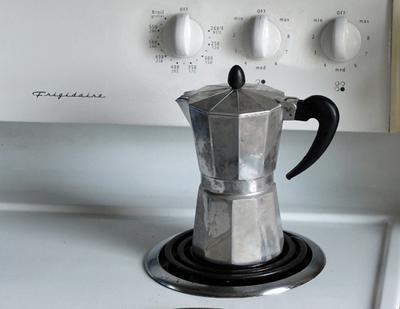Is it safe to make coffee in an aluminum coffee maker?
by Mark B.
(Ottawa)

Aluminum Moka coffee maker.
QUESTION:
I have a fairly old coffee percolator, and I’m pretty sure the inside basket, that holds the coffee, is made from aluminum. I also have a stovetop moka coffee maker, and I think the whole thing is made from aluminum.
The point is, I read somewhere that it’s dangerous to cook or make hot drinks with aluminum. If I remember right, there was even a reference to a connection between aluminum and Alzheimer’s disease.
Is this true or an urban myth? Is it OK to keep brewing with my trusty aluminum brewers?
Mark
ANSWER:
Mark...excellent question.
Like you say, there has been plenty of talk over the years about aluminum being connected with Alzheimer’s and other forms of dementia.
But when you dig a little deeper you’ll find there is very little science backing those claims.
According to the Alzheimer’s Society, “Although initial studies linked aluminium toxicity with Alzheimer's disease, the link has not been proven despite continuing investigation. Importantly, there is no evidence to suggest that aluminium exposure increases your risk of dementia.”
In addition, it’s worth knowing a few facts about aluminum and our exposure to it.
First off, it is the third most common element on Earth. It’s everywhere...in the soil and in the water, and in the fruits and vegetables we eat every day, albeit in small quantities.
As for exposure in the home, it is found in buffered aspirin, some antacids, antiperspirants, and even in pickled and processed foods.
And yes, if you make coffee in an aluminum brewer, you’ll likely be exposed to a very small amount of the metal.
But let’s put this in perspective.
According to Cook’s Illustrated (January 2012), after lab tests were conducted on tomato sauce cooked in aluminum for two hours – tomato is very acidic - and then stored in the same pot for several hours, the sauce contained only .0024 milligrams of aluminum per cup.
That’s really not very much when you consider that a single antacid tablet may contain more than 200 milligrams.
If you are super-cautious, stick to stainless steel. But if you follow the science, it looks like there is pretty much no risk to brewing your coffee in aluminium.
Nick





